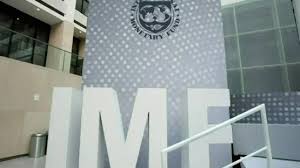The International Monetary Fund (IMF) has praised the Central Bank of Nigeria (CBN) for the bold reforms it introduced to stabilise the economy, but warned that Nigeria may exceed its 2025 fiscal deficit target due to falling oil prices and poor production levels. This was contained in the Fund’s latest Article IV Consultation report on Nigeria, released after a recent visit by IMF officials to the country.
The IMF commended efforts by the CBN, led by Governor Olayemi Cardoso, in driving key monetary reforms over the past two years. These include the recapitalisation of commercial banks and foreign exchange market reforms that have brought more transparency and boosted investor confidence. According to the report, reforms in the FX market and a more stable naira have improved dollar liquidity and promoted price discovery.
The IMF said the banking sector recapitalisation is critical to prepare Nigeria’s banks to support a $1 trillion economy and absorb future economic shocks. The process is expected to be completed by March 2026. The apex bank has also focused on financial inclusion by using digital banking platforms and launching initiatives such as the Women’s Financial Inclusion Programme to reach underserved Nigerians.
While acknowledging these gains, the IMF warned that Nigeria’s 2025 fiscal projections are under pressure. It pointed to lower oil revenues, reduced production, and capital expenditure challenges as key risks to the budget. The Fund urged fiscal authorities to revise the 2025 budget and adjust government spending accordingly. It noted that the expected fuel subsidy savings, which could amount to two per cent of GDP, may not fully materialise.
If those savings are lost and the country’s new tax reforms do not generate immediate revenue, the IMF recommended that the federal government cut recurrent spending to protect capital investments that drive economic growth.
The Fund also advised Nigeria to fast-track the implementation of targeted cash transfers for the poor and maintain a neutral fiscal stance that supports macroeconomic stability. On monetary policy, IMF directors noted that the CBN’s tight approach should continue until inflation is brought under control.
The IMF also welcomed the end of deficit monetisation and ongoing work to improve CBN governance, describing these as important steps toward building a solid institution capable of inflation targeting. It further stressed the need for a foreign exchange intervention strategy that minimises volatility, calling the exchange rate an important shock absorber.
The Fund recognised the gains Nigeria has made since the elimination of the multiple exchange rate regime. The CBN introduced the “willing buyer, willing seller” model and launched a digital trading platform known as B-Match. These reforms helped reduce the forex premium between official and black market rates from over 60 per cent to below 3 per cent. Foreign portfolio inflows reached $6.9 billion in the first quarter of 2025, while external reserves rose to $40.9 billion by the end of 2024—enough to cover over eight months of imports.
Investor confidence has grown, and Nigeria was able to return to the Eurobond market after a four-year break. The IMF also said the CBN has supported the FX market through new diaspora-focused products, licensing more International Money Transfer Operators (IMTOs), and giving IMTOs quicker access to naira liquidity.
Data from the apex bank shows Nigeria’s Net Foreign Exchange Reserves climbed to $23.11 billion at the end of 2024, the highest in over three years. This marks a big improvement from $3.99 billion in 2023 and $8.19 billion in 2022. The IMF said the central bank’s approach has restored transparency and confidence in the FX market.
Aminu Gwadabe, President of the Association of Bureaux De Change Operators of Nigeria, said these reforms have boosted remittance inflows from Nigerians in the diaspora, estimated at $23 billion annually. He said this inflow is now a steady source of foreign exchange for Nigeria.
Charlie Bird, Director of Trading at Verto, said during a recent seminar that Nigeria is becoming more attractive to foreign investors thanks to improved dollar liquidity and policy transparency.
Meanwhile, President Bola Tinubu recently signed four new tax bills into law. These are the Nigeria Tax Bill (Fair Taxation), the Nigeria Tax Administration Bill, the Nigeria Revenue Service (Establishment) Bill, and the Joint Revenue Board (Establishment) Bill. The IMF described these laws as a key step to improve revenue collection, reduce dependence on oil income, and ensure debt sustainability.
On the fight against financial crimes, the IMF noted progress in Nigeria’s Anti-Money Laundering and Combating the Financing of Terrorism efforts. However, it urged authorities to resolve the remaining gaps so Nigeria can exit the Financial Action Task Force’s grey list.
Despite progress, the IMF said challenges remain. Inflation is still high, and key issues like insecurity, poor infrastructure, and low agricultural productivity need urgent attention. The Fund advised the government to invest more in health, education, and electricity to build a stronger and more resilient economy.
Looking ahead, the IMF projected that Nigeria’s economy will grow by 3.4 per cent in 2025, supported by increased oil output, the new Dangote Refinery, and a strong services sector. Medium-term growth is expected to stay around 3.5 per cent as reforms continue to take effect.
